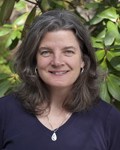My primary teaching and research interests involve exploring the impact of human activity on the environment. I teach a first year seminar called Burning Our Planet (FYS 284), an introductory course called Earth Surface Processes (GEO 103), an intermediate course in Environmental Geochemistry (GEO 240) and advanced courses in Biogeochemistry and Paleoclimatology (GEO 367) and Stable Isotopes and Past Environments (GEO 340).
My primary research projects revolve around evaluating the role of anthropogenic influences on local, regional and global environments by reconstructing records of carbon cycling and environmental change through time. I measure the stable isotope composition of modern and ancient organic matter and collaborate with many scientists to study: (1) vegetation shifts in central and northern Australia to understand the complex interactions between human activity, animal extinction, vegetation, and climate over the last 60,000 years; (2) changes in the cycling of terrestrial carbon during periods of significant and rapid climate and sea level change in coastal Maine, the NE Siberian Arctic and the Australian tropics; (3) paleo-food web dynamics among humans and marine organisms in the Penobscot Bay, Gulf of Maine, through the last 5,000 years; and (4) modern food web dynamics and nutrient transfer in salt marshes, coastal Maine. I am also interested in the water quality of local watersheds, including phosphorus cycling in the Sabattus and Androscoggin River watersheds.

